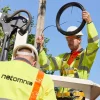Job Losses as UK Full Fibre ISP Fibrus Start Redundancy Process UPDATE

In a perhaps unsurprising development, given recent news, Infracapital-backed broadband ISP Fibrus, which is building a new full fibre (FTTP) network across Northern Ireland and parts of North England, have begun a redundancy consultation that is expected to result in an unspecified number of job losses among their civil engineers.
Just for context. Last month we revealed that Fibrus had pulled out of their state aid supported Project Gigabit contract for the North East of England and, on top of that, they paused their related commercial build plans for Northumberland and Durham (here). “Given the state and cost of the capital markets we have taken the decision to focus our equity and debt funding in our home markets of NI and Cumbria,” said the operator.
The move reflected a significant change for the operator, which had previously been targetting a commercial build to cover 125,000 premises across 40 locations in the North East of England (here). On top of that, the Government had valued the separate Project Gigabit contract at £82.7m, which would have helped to extend gigabit broadband coverage to an additional 53,200 of the hardest to reach premises.
Advertisement
However, it’s no secret that network operators across the market are currently also being placed under a lot of strain, not least due to issues like rising build costs (inflation, leases, suppliers etc.) and the greater difficulty in raising fresh investment. Instead, we’ve seen a lot of full fibre builds switching their focus to growing take-up, as they try to weather the storm.
Suffice to say, the decision by Fibrus to focus on Northern Ireland and Cumbria was a natural result of this, but the loss of such a major project always seemed like it might have some impact on jobs too. But according to a new article on BBCNews, which doesn’t appear to be aware of the recent change in the North East, Fibrus are linking this redundancy consultation to the “imminent completion of its roll out in Northern Ireland.”
A Fibrus Spokesperson said:
“The company plans to continue to grow its customer facing areas while the workforce in network construction and relevant supporting areas is expected to be reduced … In light of the imminent completion of its roll out in Northern Ireland, the company has begun a consultation with its staff on the roles that will be affected due to this programme being completed.
The focus of the company now will be to continue with its aggressive customer acquisition plan, with the company already servicing some 70,000 customers to date, a growth of over 40,000 in the past twelve months.”
At this stage it remains unclear how many jobs will go or how much all of this recent disruption will impact their original target of covering 1 million premises by around the end of Q1 2026 – reflecting around 450,000 premises in N.Ireland (c. 50% of homes in the region) and the rest from England. In the past, there had also been some talk about expanding into Scotland, but that too seems unlikely to move forward.
Fibrus’ last overall progress update was in August 2023, when the operator revealed that their network had covered a total of 300,000 UK premises (273k RFS) and was home to 50,000 customers (now 70,000). At the time, the operator predicted that it would cover 400,000 premises by March 2024 (i.e. 150,000 in a single year), although it’s unclear how close to that they are today.
Advertisement
However, if they are getting close to 400k, and most of those will be from their N.Ireland build, then it does appear as if they’re getting closer to completion of their build plans on the N.Ireland side. Naturally this means they won’t be dramatically expanding that side of their build again, at least not anytime soon, which of course also means fewer engineers as the operator switches to focus on maintenance and growing take-up.
UPDATE 22nd January 2024
Feedback from those impacted suggests that around 60 workers could be facing the chop.
Mark is a professional technology writer, IT consultant and computer engineer from Dorset (England), he also founded ISPreview in 1999 and enjoys analysing the latest telecoms and broadband developments. Find me on X (Twitter), Mastodon, Facebook, BlueSky, Threads.net and Linkedin.
« Nokia and Zayo Push Data Speeds of 1Tbps Over 1004km UPDATE
Clarifying Scotland’s R100 Broadband Rollout Progress UPDATE »





















































I think this is the tear when we will start to see a real consolidation of the Alt Nets. At present most are cutting back to slow down the rate at which they are burning through cash.
Agreed, I see all the alt nets merging into one to become the third national telecom / infrastructure provider behind virgin media.
They won’t all merge into one, but it won’t be far off.
No doubt there’ll be some that are entirely overbuilt by combinations of other altnets, and those will be the ones going out of business.
Some overbuild following consolidation is inevitable, but you don’t want to be the one holding the shares in anything that gets overbuilt to a large degree and has not yet sold out.
Standard telecoms practice. Once the build phase is over get rid of most of the builders. We will see a lot of this as the networks become mature.If you don’t need to dig why employ diggers.
They are often contractors so they can be ” got rid of ” easily.
Question is how does this consolidation come about? Cash is no longer free flowing and no doubt some investors will be questioning whether they are likely to see the fabled pot of gold at the end of this particular rainbow. Which leads to the question who for example is going to advance large sums of cash for buyouts of other altnets?
How do they consolidate they could agree to a buy out or they could let them fold and buy it up cheaply as the debts will be written off
@BigDave – It will be some big conglomerate that does it – Be it someone local like fern (who own Octopus and now Swish/Jurasic/Giganet) or a foreign firm that wants a UK footprint. Yes its become more expensive to borrow but its also a good opportunity to buy assets cheap.
Consolidation can be expensive with various integration costs. For an altnet to take over another altnet, they would have to connect the new acquisition to their management platform, if compatible, and probably pay for backhaul connectivity too. If the altnet doesn’t have enough customers to justify the acquisition/integration costs, then it’s unlikely they’d be taken over.
For altnets that fail with no takeover interest, Openreach as the likely supplier of last resort will probably migrate the customers onto their own OLT’s and reuse the customer premise ONT’s if they’re compatible, or replace them if they’re not.
newxfibre have both the cash and the motivation to aquire any altnet that doesn’t overlap VM’s FTTP too much.
The way some altnets are rolling out it’s a wonder more of them aren’t going bust.
In our area, Fibre and Wireless have been “clearing ducts” for 14 months. Loads of vans and roadworks showing on roadworks.org but little sign of any fibre being laid or customers being connected.
From a financial / cashflow perspective the model is bonkers – they would be better off extending their network street by street and connecting customers as they go – more cash in earlier to fund future Capex.
Absolutely. Swish dug the path in our area 12 months ago and dug our path up to run a duct (without giving anyone notice I may add) and they still aren’t live now, in fact they have just been back in the last week and started string cables between the poles. Openreach started In March ’21 and went live in September so they now have a 2 1/2 year head start over their altnet rivals and a 43% take up. I thought they were supposed to be the lethargic and complacent ones. So much for the fabled efficiency of the free market.
In the last 12 months my street has been dug up four times by four different fibre companies laying their cables. The road is now a lumpy mess with uneven, badly filled holes where water collects and is looking almost third world. Just 18 months ago the council resurfaced my road. It would appear there is no coordination, considered planning or work standards being implemented.
It took the HFC cable industry 25 years to ‘consolidate’ down to 1 – so I wouldn’t hold your breath on altnet consolidation anytime soon. For sure there’ll but some but it will be relatively small scale. Everyone predicted consolidation last year and, apart from a few mergers of companies owned by the same investors, there wasn’t much. Besides, these altnets aren’t going to go for a penny so if you can’t afford to build how can you afford to buy?
Technically I think there are 2 HFC networks that exist in the UK – Virgin Media and WightFibre. WightFibre escaped the cable merger frenzy of the early 2000s and still has an HFC network. It’s probably a moot point, as WightFibre are quite a small network and are making the transition to FTTP.
It’s also worth pointing out that along the way the equity in the UK HFC operators was wiped out.
Definitely a salutory lesson, should anyone actually be thinking.
@Yeehaa just to note that WightFibre switched off their HFC network about 2 years ago and migrated all customers to full-fibre. They only do FTTP now
I feel for the engineers, I’ve been in the same boat twice. Sadly I think there is more of this to come as some of these altnets look to recover costs asap. Before those companies get bought out by the big giants they set out to compete against. It will be like when Virgin was allowed to somehow swallow the entire cable TV market in the UK and buy out every other provider.
Always a shame for the staff.
On a lesser note the customers that may also be impacted.
Remember when you could only connect a phone with the green circle BABT approval sticker.
If standards like this had been applied to ONTs and fibre connections maybe it would be easier to consolidate and swap networks.
Pah. I remember when you could only have a telephone from the British Post Office, installed by them. Any colour you liked, as long as it was black. No self-install.
@MikeP. Haha! Yeah, we had a party line when I was little. Having to go round to the neighbour and get them to put the handset back in the cradle after their dog had knocked it off just so you could make a call.
I remember the battle we had with BT after we moved into our house in the 80’s. When we arrived there was one of the then new line Jacks with a trim phone plugged in. A few years later we had a right battle when we wanted to get rid of the rented phone and buy our own. They insisted the socket had been fitted illegally and we should remove it. They only backed down when we pointed out that we inherited it and was fully marked up as their equipment and they sent an engineer to check it.